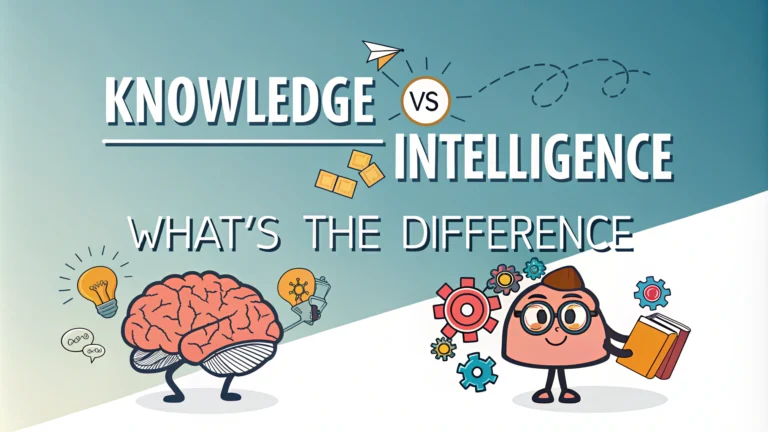Understanding the distinction between knowledge and intelligence helps unlock better learning and personal development. Many people interchange these terms, but they represent different mental capabilities that shape how we learn and solve problems.
The relationship between knowledge and intelligence works like a computer’s hardware and software – intelligence is your brain’s processing power, while knowledge represents the data and information stored within.
Types of Intelligence and How They Work
- Fluid Intelligence – The ability to solve new problems and reason abstractly
- Crystallized Intelligence – Using learned knowledge and experience
- Emotional Intelligence – Understanding and managing emotions
- Spatial Intelligence – Visual and spatial judgment
Building and Applying Knowledge Effectively
- Explicit Knowledge – Facts, information, and skills acquired through education
- Tacit Knowledge – Intuitive knowledge gained through experience
- Procedural Knowledge – Understanding how to perform specific tasks
| Knowledge | Intelligence |
|---|---|
| Can be acquired | Largely inherited |
| Increases with learning | Relatively stable |
| Specific to subjects | General mental capability |
The Science Behind Learning and Processing Information
- Working Memory – How we process new information
- Long-term Memory – Where knowledge is stored
- Pattern Recognition – How intelligence helps connect information
> “Intelligence is not about knowing everything, but rather about having the capacity to understand and learn from new experiences.”
Practical Applications of Knowledge and Intelligence
Real-world success comes from combining both knowledge and intelligence effectively. **Problem-solving** and **decision-making** improve when we understand how to use both capabilities together.
The key is matching your learning approach to your intelligence strengths while building relevant knowledge for your goals.
Learning Strategies Based on Intelligence Types
- Visual Learners – Use diagrams, mind maps, and visual aids
- Auditory Learners – Record lectures, participate in discussions
- Kinesthetic Learners – Hands-on practice, physical movement
- Reading/Writing Learners – Take notes, create summaries
| Learning Style | Best Study Methods |
|---|---|
| Visual | Charts, videos, illustrations |
| Auditory | Podcasts, group discussions |
| Kinesthetic | Role-playing, experiments |
Enhancing Both Knowledge and Intelligence
- Regular Mental Exercise – Puzzles, learning new skills
- Physical Activity – Exercise improves cognitive function
- Healthy Diet – Brain-boosting foods and nutrients
- Quality Sleep – Essential for memory consolidation
> “Learning without thinking is labor lost; thinking without learning is dangerous.” – Confucius
Moving Forward: Practical Steps for Growth
Set clear learning goals that match your intelligence strengths. Focus on building knowledge that matters for your personal and professional development.
Remember these key actions:
- Identify your learning style and intelligence strengths
- Choose learning methods that work best for you
- Practice active learning through real-world application
- Maintain healthy habits that support cognitive function
The path to improvement starts with understanding how your mind works and using that knowledge to learn more effectively.
Knowledge vs Intelligence FAQs
Q: What is the main difference between knowledge and intelligence?
A: Intelligence is the ability to learn, understand, and solve problems, while knowledge is the collection of facts, information, and skills acquired through experience or education.
Q: Can someone be intelligent without being knowledgeable?
A: Yes. Intelligence is an innate capacity to process information, while knowledge must be acquired. Someone can have high intelligence but limited knowledge in specific areas.
Q>: How does IQ relate to knowledge?
A: IQ measures cognitive ability and problem-solving skills, not accumulated knowledge. A high IQ indicates strong learning potential but doesn’t guarantee extensive knowledge.
Q: Is knowledge or intelligence more important for academic success?
A: Both are crucial. Intelligence helps in understanding complex concepts quickly, while knowledge provides the foundation for advanced learning. Success typically requires both elements.
Q: Can knowledge increase intelligence?
A: While knowledge doesn’t directly increase intelligence, learning new skills and information can improve cognitive function and problem-solving abilities.
| Knowledge | Intelligence |
|---|---|
| • Acquired through learning • Can be measured through tests • Increases with experience |
• Natural mental capability • Measured through IQ tests • Relatively stable throughout life |
Q: What role does working memory play in intelligence vs knowledge?
A: Working memory is a component of intelligence that helps process new information. Knowledge helps organize this information more efficiently.
Q: How do employers value knowledge vs intelligence in hiring?
A: Employers typically seek both:
- Knowledge: Specific skills and experience
- Intelligence: Problem-solving and learning ability
Q: Can artificial intelligence replace human knowledge?
A: AI can store and process vast amounts of information but lacks human understanding and contextual wisdom that comes from experience.
Q: What’s the relationship between street smarts and book smarts?
A: Street smarts often reflect practical intelligence and applied knowledge, while book smarts represent academic knowledge and theoretical understanding.
Q: How does crystallized vs fluid intelligence relate to knowledge?
A: Crystallized intelligence represents accumulated knowledge and experience, while fluid intelligence is the ability to solve novel problems regardless of prior knowledge.

